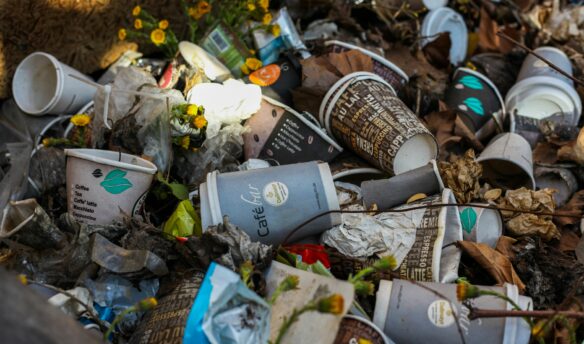Competition amongst coffee shops ramps up in Korea, Luckin Coffee swings again for international expansion, and the NLRB may order Starbucks to bargain with a shop that formerly voted against unionizing.
Let’s talk about the week in news.
📩 Get the latest coffee trends in your inbox weekly—subscribe here.
‘Korea’s Coffee War Pits Shop Against Shop as Prices Plunge’ – via Korea JoongAng Daily
Korea’s coffee companies are at war. The country’s cities are filled with cafes, putting companies in direct competition with one another. And sometimes, your biggest rivals are right next door.
It’s not unusual to see multiple cafes on the ground floor of a single office building. If one competitor decides to try to undercut the others by selling just a single item for less, the price shift can ripple out until suddenly, everyone has to slash their margins. “If the cafe next door sells things cheaper, I have no choice but to cut my prices,” one cafe owner said.
And as Korea’s coffee shops multiply, this trend is happening more and more.
Korea calls itself “The Republic of Coffee,” a nickname that seems appropriate when you consider:
- Korea has about 51 million people and nearly 99,000 cafes. That works out to 1,384 cafes per million people. Japan, by comparison, has 529 cafes per million people.
- Average coffee consumption in the country is 367 cups per year, second in the world and more than double the global average.
- The coffee market in Korea was worth $300 million in 2007; by 2021, it had grown to $4.3 billion.
The number of cafes increased by 21 percent in 2021, and more than 17 percent in 2022. Analysts cite coffee’s popularity and the low financial barrier to entry as reasons for this boom. “The younger generation often jump into the coffee industry thinking they have the capability, as many of them have experience working part-time at a cafe and it requires little capital,” one consultant said.
But with this increase comes competition. Small cafes are competing with big chains and convenience stores, which can remain profitable with narrower margins. Although coffee shops are opening quickly, many are closing—over 2,000 in Seoul last year alone. “These days, the coffee war is like cutting one’s nose off to spite one’s face,” said Hyeon Hyeok, CEO of distributor Broaden Coffee, “with one new shop shutting down two old ones.”
‘Luckin Coffee Reportedly Preparing for International Expansion’ – via World Coffee Portal
If at first you don’t succeed…
Luckin Coffee, the scandal-ridden Chinese chain that emerged from bankruptcy in April of last year, is once again looking to expand internationally. As part of its expansion plans, the company is exploring potential markets in Indonesia, Singapore, and Thailand by relying on small-format cafes and offering competitive prices to rivals.
This would be Luckin’s second attempt at international expansion. In 2019, Luckin planned to team up with a Kuwait-based franchise firm to establish the brand in the Middle East and India.
That never happened: one year later, an internal investigation found that Luckin executives had fabricated hundreds of millions in sales. The company’s stock price plummeted and was eventually delisted from the Nasdaq.
Luckin filed for bankruptcy protection in early 2021 and since then has rallied with 66 percent year-on-year revenue growth. It has recently announced plans to increase its franchise presence across China, allowing Luckin to keep its status as the country’s largest coffee chain ahead of rival Starbucks.
More News
‘Starbucks is Doubling Down on Coffee Delivery’ – via Restaurant Business Online
‘Probat Rolls Out its Largest Electric Roaster to Date, the P12 E’ – via Daily Coffee News
‘7-Eleven Now Serves Oatly’s Oat Milk at 90 Coffee Stations’ – via Veg News
‘Soil Moisture in Brazil’s Sugar, Coffee Areas Hit 7-year Peak’ – via Reuters
‘Second Color of Coffee Collective Symposium Coming to Houston’ – via Daily Coffee News
‘UK Branded Coffee Chains Defy Economic Challenges to Achieve Strong Growth’ – via World Coffee Portal
‘Top Lot at 23rd Brazil Cup of Excellence Earns $43 Per Pound’ – via Daily Coffee News
‘Is The Coffee Tech Bubble About To Burst?’ – via Sprudge
‘Coffee Prices Poised to Climb With Bean Shortfall Nearing Third Year’ – via Bloomberg
The Week in Coffee Unionizing
A rare request from a US labor board official could force Starbucks to collectively bargain with workers at a Florida store—even after the store voted by a nearly two-to-one margin against unionizing.
David Cohen, the regional director of the National Labor Relations Board in Tampa, filed a complaint against Starbucks, alleging that “unlawful threats, retaliation and surveillance by Starbucks managers were so severe that holding a new election at the store would be futile.” Cohen argued against simply re-doing the vote, arguing that the company’s actions had damaged the process so completely that there was only a “slight possibility” of a fairly run election altogether. The best way to rectify the situation was to compel collective bargaining.
Starbucks said its actions at the Estero, Florida, location were in full compliance with federal labor law. Workers at the store voted 21-11 against forming a union in May amid a nationwide organizing campaign that has seen dozens of allegations of union-busting activity against Starbucks.
Organizers have submitted at least 325 unfair labor practice charges against Starbucks for conducting what they call a “scorched-earth” anti-union campaign. This new filing contains similar allegations: among other charges, Cohen “alleged that Starbucks fired a worker because they were a lead organizer for the union, threatened to withhold raises and benefits if workers unionized, and carried out ‘closer than normal supervision’ of workers to discourage them from forming a union.”
The case will now be heard before an administrative law judge. However, cases like this can take months or years to be litigated—and can be challenged on appeal—so it’s uncertain when this issue will be settled.
The Week in Corporate Coffeewashing
Carbon offsets play a big role in big companies’ sustainability and net-zero pledges. For example, a coffee company might pay to reforest a piece of land, calculate the carbon those trees will sequester, and use that to offset their emissions from roasting. A new investigation into the world’s largest carbon offset provider has found that more than 90% of their rainforest offset credits “are largely worthless and could make global heating worse.”
The investigation looked into Verra, the world’s leading carbon standard organization. It found that a vast proportion of their rainforest offset credits are likely to be “phantom credits,” that only a few rainforest projects showed evidence of reductions in deforestation, and that human rights issues were “a serious concern” in at least one project, with evidence that residents had been evicted from one village in Peru before their homes were demolished.
Some of the companies named include Gucci, Salesforce, Shell, the band Pearl Jam, and Lavazza. Lavazza said it bought credits from Verra as part of its “serious, concrete and diligent commitment to reduce” its carbon footprint.
While Lavazza was the only coffee company called out in this report, brands such as Nespresso, Starbucks, Keurig Green Mountain, Peet’s, and many more use other carbon offsets as part of their sustainability pledges. While popular with corporations, indigenous groups and climate activists denounced offsets as a greenwashing tactic. Greenpeace calls them “a scam,” and the Indigenous Environmental Network and Indigenous Climate Action have said that offsetting is “a false solution that… gives polluters an excuse to continue polluting.”
Others take a more nuanced approach, claiming that carbon offsets are valuable so long as they complement other reduction efforts, not simply a substitute for continued emissions. Meanwhile, Verra questioned the methodology of the studies and argued that their conclusions were incorrect, and Lavazza said it plans to look more closely at the project.
Is Coffee Good For You?
Those who like their coffee sweetened should beware, for it could cause them to lose their hair.
A new study from China found a link between drinks with added sugar, including coffee and tea, and increased instances of male pattern hair loss (MPHL). Published in the journal Nutrients, the research involved more than a thousand participants between ages 18-45, using a self-reported online survey to gather data on, among other things, socio-demographic information, diet, lifestyle, and hair status.
MPHL is the most common form of hair loss in men, affecting between 30-50 percent by age 50, and the rate could be increasing—surveys in China found prevalence had increased from 21.3 percent in 2010 to 27.5 percent in 2021.
The researchers focused on sugar-sweetened beverages (SSBs) such as “sweetened juice beverages, soft drinks, energy and sports drinks, sweetened milk, sweetened nut milk, sweetened tea beverages, and sweetened tea and coffee.” They found that high SSB intake was associated with a higher risk of MPHL, and for sweetened coffee and tea drinks, moderate consumption was linked to a “significant” increase.
Unsweetened coffee and tea in small amounts were also associated with significant risk, but as consumption increased, the results became non-significant. Studies like this have limitations—self-reported data is always a bit iffy, and the online nature of the survey could exclude people without access to the internet—and the authors urge further study.
Until then, keep drinking your coffee without sugar. It’s a hard life.
Beyond the Headlines
‘The Pods Must Be Crazy: Why The Coffee Pod Carbon Impact Story You Just Read Is Wrong’ by Zac Cadwalader
‘When Coffee Loved Noma’ by Ashley Rodriguez
‘Peet’s Coffee Workers Are Following Starbucks Workers’ Lead in Organizing Unions’ by Faith Bennett
















